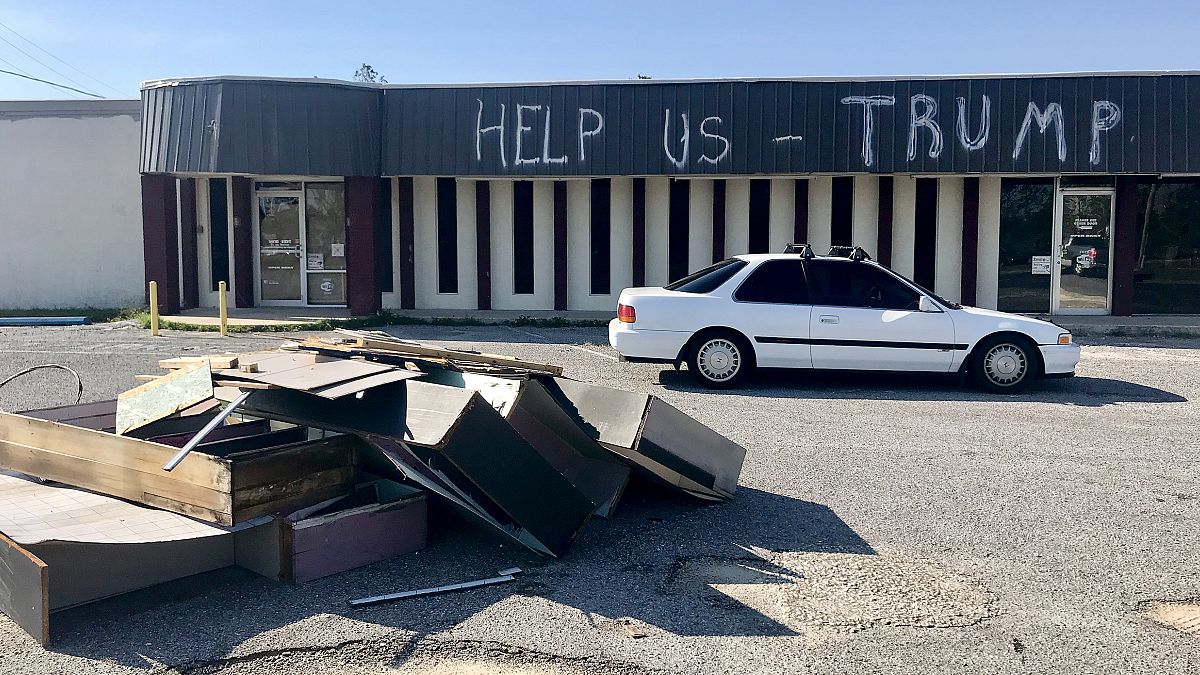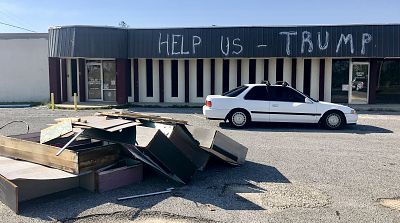Panhandle communities devastated by lack of federal aid seven months after Hurricane Michael say the government as a whole has let them down.
PANAMA CITY BEACH, Fla. — It's been seven months since Hurricane Michael wrecked Gail Philyaw's house here, but she still can't quite bring herself to call the government-provided trailer she now lives in "home."
Parked in her yard, sandwiched between a storm-crushed car and piles of debris, the Coleman five-wheeler is temporary housing until the grandmother of 20 can move back in to her own house, which still needs a new roof and flooring.
"Mrs. Gail," as she's known around the neighborhood, is hopeful that President Donald Trump's visit to the region Wednesday will bring much-needed attention to the community's plight and, ideally, news of supplemental disaster relief that could help people like herself who remain in "dire need" of assistance.
Her frustration extends to Congress as well, which has failed to pass comprehensive federal funding for the area.
"They aren't out here. They're up there in A/C. When they leave the Congress, they can go to nice rides, nice cars, homes, and they all right. They don't worry about money. We worry about money," she said, standing outside her mobile home in the sweltering heat. "We're struggling. Day by day."
There are many stories like hers across the Panhandle, where displaced residents are still struggling to rebuild 210 days after Michael slammed into their shores.
It's not just the residents who hope the president's visit will help secure supplemental funding. Florida lawmakers are also hoping the trip will prompt Trump to agree to fast-track a deal that could ultimately pass both the House and Senate amid concerns that current FEMA dollars will leave the state and county to foot part of the massive cleanup bill.
Earlier this year, an effort to pass disaster relief for Michael and other natural disasters fell apart over how much money would be allotted to Puerto Rico. The U.S. territory is still reeling from storms that battered the island in 2017.
Two Republican senators sent a letter to their colleagues pushing for a vote as early as this week. "We see no reason to delay it any longer," Sens. Rick Scott of Florida and David Perdue of Georgia wrote. "We should demonstrate to the American people that in times of natural disasters, Washington can still work."
Sen. Marco Rubio, R-Fla., has also been an outspoken critic of the slow federal response, writing in a recent op-ed that "the most vulnerable are discarded as pawns in a politically charged fight for power in Washington, D.C."
The Trump re-election campaign, for its part, is placing blame squarely on Democrats. "Pelosi, Schumer, and congressional Democrats are holding disaster relief funding hostage for purely political reasons," national press secretary Kayleigh McEnany told NBC News in a statement.
Campaign officials would not say whether the president plans to announce any progress on hurricane relief at his campaign-style rally Wednesday evening, but conceded that the region's struggles were a factor in choosing to come here.
"After Hurricane Michael, President Trump ensured that nearly $1.4 billion was provided to affected regions, and he oversaw a FEMA response effort that removed 36 million cubic yards of debris, helped 36,300 survivors with home repairs and rental assistance, and provided other needed aid," McEnany said. "Following President Trump's example, Democrats need to stop playing politics and put funding for devastated states first."
But for many Floridians — like Kimberly Shoaf, who lost her home and business to the Category 5 storm — that is not enough.
"I hope that the president really takes this opportunity to see constituents who put him into office and how they are still struggling," she said Tuesday, talking over the loud din of machinery still clearing downed trees in Mexico Beach.
Shoaf, a mother of two who voted for Trump in 2016, also had a message for Congress: "We are the people who put you into office. We need you to come put boots on the ground here, see what we are dealing with, day in and day out."
She added, "We don't even have the resources necessary to put our town back together."
Those whose homes were spared are also desperate for action. Mara Harrison and her husband, Reese, started a nonprofit organization called Hope Panhandle to rebuild homes (like Mrs. Gail's) since the federal government was taking so long to provide supplemental funding.
"The community is still very broken. And the people who live here feel very forgotten for many justified reasons," Harrison said while standing outside one her renovation projects. "When there are faces behind the hurt, it's not a time to pull political cards, it's not a time to wave political flags. It's a time to put all those views aside and make a decision that's based on humanity."
The local economy is also suffering. Tyndall Air Force Base, where the president is expected to land Wednesday evening, suffered damage to nearly all 700 structures on site. The base is a big employer for the area, so there is both economic anxiety and national security concerns surrounding its incapacitated state, according to local lawmakers.
Beyond Tyndall, the county thrives predominantly on tourism and the timber industry, both of which were severely affected by Michael.
Small-business owners like Michael Scoggins, whose restaurant Killer Seafood was washed away completely, challenged lawmakers and the president to consider the bigger picture and agree to a deal soon.
"Whether it's us and the hurricane, people in tornadoes, fires, the floods in the Midwest, people in Congress have to have someone close to them or in their own region that is severely affected by these disasters so it's time to man up," he said, looking over the marble slab where his livelihood once stood. "Do your job."

